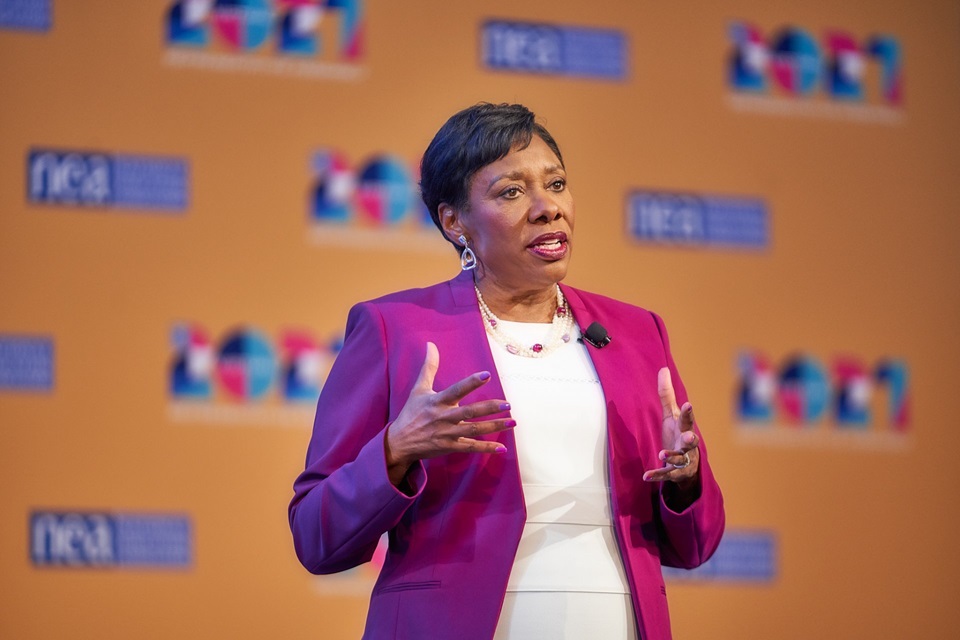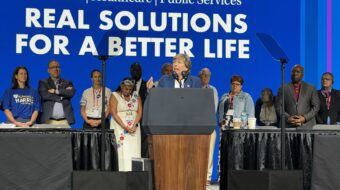
WASHINGTON—Despite systemic racism within U.S. society overall and even within unions themselves, unions are the best vehicle for Black workers and families to make economic progress, said National Education Association President Becky Pringle and a panel of speakers of which she was a member.
But to realize that potential, especially for the younger generation of workers of color who will soon be the majority of the U.S. workforce, unions—as well as society—will have to open up to their agenda and push them ahead to leadership positions, too, panelists added.
Speakers discussed a wide range of barriers to Black and brown upward mobility in the U.S. at the Zoom call conference, convened by the Congressional Black Caucus Foundation.
Those obstacles include not just legalized discrimination such as in the Jim Crow South and in some big “red” states today, but also redlining, “last-hired first-fired” lenders’ refusal to invest in Black-owned business startups, and barriers which still remain within white-dominated organizations, including unions.
It also doesn’t help that a large share of the nation’s Black population, if not an outright majority, still resides in states—notably in the old South—dominated by “anti-union politicians,” said another speaker, Rep. Bonnie Watson Coleman, D-N.J.
Pringle, a Black science teacher from Philadelphia, said there are barriers to Blacks in education, too. One of them is rampant hostility to unions—hostility, though she did not say so, that dates back for decades as elitist white racists who controlled the society and its purse strings strove to pit race against race and prevent working-class unity.
“You don’t have the right to bargain and sometimes the right to organize isn’t legal” in states, though she did not name them, such as Texas, both Carolinas and Florida. “So we have the lowest percentage of Black teachers in the South and they suffer even more from the wage gap there, especially compared to professionals with the same experience and training.’
That wage gap, though lesser outside the South, bedevils the entire teaching profession, NEA data shows. Teachers, who must have master’s degrees, student teaching experience, mentoring, and up-to-date professional training, have fewer opportunities to advance than colleagues with similar credentials.
As a result, Pringle cited a massive yearly turnover in the teaching profession from coast to coast, with 58% of well-trained teachers planning to leave for higher-paying—and less-stressful—jobs and greener teachers replacing veterans in schools with high shares of children from low-income families, who need experienced and patient teachers the most.
“Those policies are impacting” both the teachers and the students, Pringle said. Now add on “more student debt to predatory lenders” and the burden gets to be too much. “We have a huge retention problem.”
“We’re trying to address this” in the name of “racial and social justice, which equals economic justice,” Pringle explained.
One solution, said Kayla Elliott of the Economic Policy Institute, is for unions to actively recruit in the South, especially in the Black community, despite the racism and the obstacles.
That includes not just recruiting unionists to professional positions—such as teaching—but also recruiting working-class Blacks in low-paying professions such as home health care. That profession is more than 80% women of color. “They’re ripe for it nationally,” she said of unionization.
And the profession will only continue to grow and can’t be outsourced, she commented. “At the end of the day, every person, even in a right-to-work state, will need a home health care aide.”
Other speakers stressed that to bring younger workers, especially younger workers of color, into the union movement, organized labor must meet them on the workers’ terms, listen to what they’re saying, implement bargaining strategies that specifically address their needs and priorities and actively work to promote members of color into positions of power.
Some unions are doing so, and the AFL-CIO Executive Council is more diverse—and younger—than it has been in generations. Others, set in their ways, aren’t. That must change, speakers said, because by 2050, if not before, the majority of the U.S. workforce will be workers of color, and they’re today’s younger workers.
“We don’t have a sense of urgency” for that task of change, Watson Coleman said. “We haven’t had it for decades, but that’s starting to change,” with the younger workers such as Amazon workers, port truckers, adjunct professors, retail workers, fast food workers, and warehouse workers leading the way.
Watson Coleman did not cite those groups of young workers who have had it up to here with corporate greed and exploitation and have taken to unionization, to the streets, or to leaving for better jobs—or all of the above—as a result. She didn’t have to.
“We need leadership that looks like us,” added Elliott. “We also have to tell stories” to younger workers that stress “systemic change, not individual change,” she noted. What Elliott did not say is the “individualism” ethos is ingrained in decades of U.S. society and reinforced by everything from corporate propaganda to Horatio Alger myths. It’s a powerful, and often hidden, force against unionization.
To overcome it and appeal to the younger non-union workers whom unions must recruit, “We have to be very real about the economy they face.”
“We have to create that space for our young people and then get the hell out of their way,” concluded Pringle.
We hope you appreciated this article. At People’s World, we believe news and information should be free and accessible to all, but we need your help. Our journalism is free of corporate influence and paywalls because we are totally reader-supported. Only you, our readers and supporters, make this possible. If you enjoy reading People’s World and the stories we bring you, please support our work by donating or becoming a monthly sustainer today. Thank you!












Comments